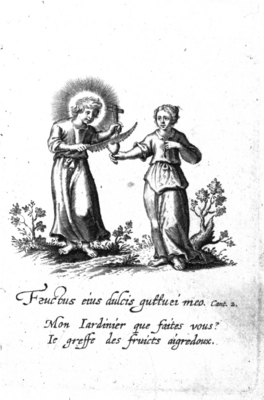Insitio Amoris [61]

XIX.
Gregor.
Iob.6.
ARbor fructifera, ipse Christus in corde nostro
per fidem plantatus existit, quam si mens di-
gnè & cōstanter excolit, fructus interius pulchros
& vtiles gignit, quos dum mens capiens auidè
comedit, omnes mundi voluptates præ eorum
dulcedine postponit. dulce enim est valde sibi cæ-
lestia cogitare, in æternitate oculum intimum fi-
gere, vt aliquando in fletibus etiam mens accensa
compungatur, & inter lachrymas subleuata An-
gelorum cibo, ipsâ videlicet sapientiâ, quanto
dulcius tanto auidius pascatur. etenim animæ
esurienti præ Amore, etiam amara dulcia esse vi-
dentur.
ARbor fructifera, ipse Christus in corde nostro
per fidem plantatus existit, quam si mens di-
gnè & cōstanter excolit, fructus interius pulchros
& vtiles gignit, quos dum mens capiens auidè
comedit, omnes mundi voluptates præ eorum
dulcedine postponit. dulce enim est valde sibi cæ-
lestia cogitare, in æternitate oculum intimum fi-
gere, vt aliquando in fletibus etiam mens accensa
compungatur, & inter lachrymas subleuata An-
gelorum cibo, ipsâ videlicet sapientiâ, quanto
dulcius tanto auidius pascatur. etenim animæ
esurienti præ Amore, etiam amara dulcia esse vi-
dentur.

Entement de l'Amour.
XIX.
Arbre d'Amour, que l'Amant mesme plante,
Et d'vn surgeon de ses deliçes ente,
Quand sera donc la saison de tes fruits?
Ce sera lors qu' vne vie plus douce,
Libre d'hyuer, d'orage, & de secousse,
Fair a meurir l'aigreur de mes ennuys.
XIX.
Arbre d'Amour, que l'Amant mesme plante,
Et d'vn surgeon de ses deliçes ente,
Quand sera donc la saison de tes fruits?
Ce sera lors qu' vne vie plus douce,
Libre d'hyuer, d'orage, & de secousse,
Fair a meurir l'aigreur de mes ennuys.
Translations
 |
Grafting of love. |
 |
The fruit-bearing tree, Christ Himself, came to be after by faith he was planted in our hearts, a tree that, if the mind tends
it worthily and constantly, brings forth beautiful and useful inner fruit. When it avidly picks them and eats them, they surpass
all the pleasures of the world because of their sweetness. For to oneself it is very pleasant to think of matters of heaven,
to fix the inner eye on eternity, so that eventually in sobs the heart also is touched by fire and, lifted in tears by the
food of angels (to wit by wisdom itself), and the more sweet the food is, with so much more appetite it takes thereof. For
to the soul that hungers out of love even bitter things appear to be sweet.2 |
 |
His fruit was sweet to my palate. |
Literature
Sources and parallels
-
Possibly based on, not mirrored, the green branch on the tree trunk behind the female figure is made vigorous, in:
Insitio amoris. [28] (in: anonymous, Amoris divini et humani antipathia (1628))
[Compare
![Compare [compare]](/static/images/compare2.gif) ]
]
-
Porteman 1975, p. 212. Simillar with: La Perriëre, Theatre
 , embl. 81
, embl. 81
-
Parallel for the pictura, the Latin bible quote and the French epigram in:'T is in uw hand [16] (in: Jan van Hoogstraten, Zegepraal der goddelyke liefde (1709))
[Compare
![Compare [compare]](/static/images/compare2.gif) ]
]
References, across this site, to this page:
- Insitio amoris. [28] (in: anonymous, Amoris divini et humani antipathia (1628))
- 'T is in uw hand [16] (in: Jan van Hoogstraten, Zegepraal der goddelyke liefde (1709))
Iconclass
Sacred love opens the heart of the soul with a saw to graft it with the cross- God's perfections
[11A23]

- the cross ~ symbols of Christ
[11D12]

- radiance emanating from persons or things
[22C31]

- heart
[31A2221]

- adult woman
[31D15]

- the soul during lifetime
[31G1]

- sawing (industrial process) (+ variant)
[47C33(+0)]

- tools, aids, implements ~ crafts and industries: saw
[47D8(SAW)]

- slipping, grafting, cutting of plants (+ variant)
[47I134(+0)]

- Obstinacy; 'Ostinatione', 'Pertinacia' (Ripa) (+ emblematical representation of concept)
[53A211(+4)]

- (personifications and symbolic representations of) Love; 'Amore (secondo Seneca)' (Ripa) (+ clothed)
[56F2(+123)]

- (personifications and symbolic representations of) Love; 'Amore (secondo Seneca)' (Ripa) (+ emblematical representation of
concept)
[56F2(+4)]

- proverbs, sayings, etc. (with TEXT)
[86(INSITIO AMORIS)]

![[H O M E : Emblem Project Utrecht]](/static/images/rd-small.gif)




































































































